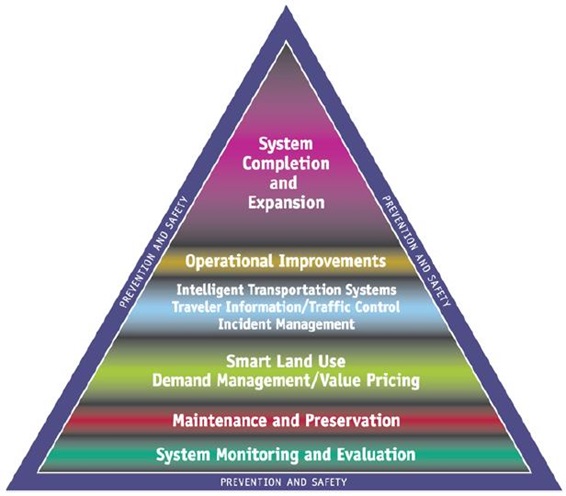Relationship to Other Caltrans Efforts
Strategic Management Plan
Integrated Corridor Management (ICM) is a collaborative effort to improve overall mobility and safety within the corridor by managing travel conditions during incidents and events having a significant impact on travel. Expected benefits of ICM include improved travel time reliability, reduction in delay, reduced incident response times, reductions in secondary incidents, and improved coordination between stakeholders. ICM is also related to other Caltrans efforts.
Statewide Planning for Operations
Planning for Operations is a concept to promote multimodal planning that supports transportation system management and operations (TSMO). System management strategies typically have high benefit to cost ratios and help Caltrans achieve its goals of system performance, stewardship, safety, and operational efficiency. New and evolving federal and state policies direct Caltrans to improve its system management planning practices as a basis for performance-based decision-making. Intelligent Transportation Systems (ITS) planning and deployment is an important component of Planning for Operations activities.
Capability Maturity Model Framework
The Capability Maturity Model (CMM) framework is intended to improve the effectiveness of TSMO applications and activities by assisting staff and management who are central players in statewide and regional TSMO agencies to understand all dimensions of TSMO and identify deficiencies. The CMM framework provides a structured focus on the six dimensions of capability, together with a facilitated self-assessment process or workshop at which participants evaluate their current TSMO-related activities using criteria from the CMM framework that define capability levels. The current challenges and low capability levels identified by workshop participants are used to identify actions needed to improve capability and are subsequently embodied in an implementation plan to improve an agency's ability to implement TSMO .
Transportation System Management and Operations
Caltrans has embarked on the development of a comprehensive program to further California's TSMO capabilities. TSMO offers the potential to provide an integrated program to optimize the performance of existing infrastructure through the implementation of specific systems and services that preserve capacity and improve reliability and safety.
Caltrans has hosted TSMO Regional Operations Forums with Caltrans districts and local agencies to identify specific corridors where TSMO activities such as incident management, traffic signal timing, ramp metering, road weather management, and others could potentially improve transportation network performance.
Transportation System Management and Operations Pyramid
In the early 2000s Caltrans established a mobility model with a foundation in maintenance and management of our existing transportation system. Efforts over time have evolved and continue to reinforce that transportation investments have more impact if built upon the philosophy embodied by our TSMO pyramid.
The base of the pyramid is system monitoring and evaluation where system performance is determined. The next level is smart land use and demand management that focus on aligning travel demand and transportation system capacity. The next level includes intelligent transportation systems (traffic signals, ramp meters, changeable message signs, etc.) that are used for monitoring and control to increase the efficient use of the transportation network. The next level includes operational improvements to further improve the efficient use of the transportation network. The final level, taken after all other actions have been completed, is system completion and expansion.


